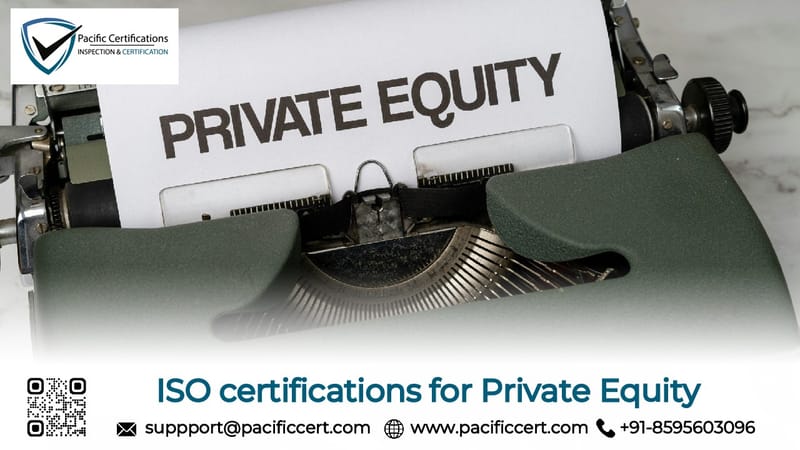ISO Certifications for Private Equity Firms, Requirements and Benefits

Introduction
Private equity firms operate in a highly regulated and reputation-sensitive environment where governance quality, information security, investment decision discipline, regulatory compliance, and operational resilience directly influence investor confidence and fund performance. Private equity organizations manage complex activities including deal sourcing, due diligence, portfolio management, financial reporting, investor communications, data handling, third-party advisors, and regulatory filings across multiple jurisdictions.
As regulatory oversight increases and investors demand higher transparency, private equity firms are expected to demonstrate structured governance, controlled decision-making, secure handling of confidential data, and robust risk management frameworks. Informal controls are no longer sufficient in an environment driven by fiduciary responsibility, cybersecurity threats, and cross-border compliance obligations.
ISO certifications provide private equity firms with internationally recognized management system frameworks to demonstrate strong governance, disciplined processes, information security, operational continuity, and risk-based decision-making, strengthening credibility with limited partners, regulators, and portfolio companies.
In private equity, long-term value is built not only through capital deployment, but through disciplined governance, controlled risk, and trusted information management
Quick Summary
ISO certifications provide private equity firms with globally accepted frameworks to manage governance and process consistency through ISO 9001, protect confidential investor and deal data through ISO/IEC 27001, ensure privacy compliance through ISO/IEC 27701, maintain operational resilience through ISO 22301, strengthen enterprise risk governance through ISO 31000, and support ESG accountability through ISO 14001. These certifications help private equity firms demonstrate transparency, risk control, and operational maturity to investors and regulators.
For more information on how we can assist your private equity firm with ISO certifications, please contact us at [email protected].
Applicable ISO Standards for Private Equity Firms
Below are the most relevant ISO standards applicable to private equity firms, investment managers, alternative asset managers, and fund management entities:
ISO 9001: Quality Management Systems
ISO 9001 provides a structured framework for managing private equity processes such as deal sourcing, due diligence, investment approvals, portfolio oversight, exit planning, and investor reporting. It promotes consistency, accountability, and continual improvement across the investment lifecycle.
ISO 27001: Information Security Management Systems
Private equity firms handle highly sensitive information including financial models, valuation data, legal documents, investor records, and strategic plans. ISO/IEC 27001 establishes a risk-based approach to protecting information from cyber threats, data breaches, and unauthorized access.
ISO/IEC 27701:2019 – Privacy Information Management Systems
ISO/IEC 27701 extends ISO/IEC 27001 to address privacy governance. It is particularly relevant for private equity firms managing personal data of investors, executives, board members, and employees across multiple jurisdictions.
ISO 31000: 2018 Risk Management
Risk management is fundamental to private equity. ISO 31000 provides principles and guidelines for identifying, assessing, and managing financial, operational, regulatory, reputational, and strategic risks at both fund and portfolio levels.
ISO 22301: Business Continuity Management Systems
Disruptions such as cyber incidents, system outages, or key personnel unavailability can significantly impact fund operations. ISO 22301 ensures private equity firms can maintain or rapidly restore critical functions such as investor communications, transaction execution, and regulatory reporting.
Click here to find out more applicable standards to your industry
Contact us today to start your certification journey with us!
What are the Requirements of ISO Certifications for Private Equity Firms?
Private equity firms seeking ISO certification must establish and maintain documented policies, procedures, and records aligned with the selected ISO standards. Key requirements include the following:
ISO 9001:2015 – Quality Management Systems
Defined investment lifecycle processes from sourcing to exit
Documented due diligence and approval procedures
Monitoring of portfolio performance and KPIs
Management of external advisors and service providers
Control of non-conforming processes and decisions
Corrective actions and continual improvement
Internal audits and management reviews
ISO/IEC 27001:2022 – Information Security Management Systems
Identification of information assets such as deal data and investor records
Information security risk assessments
Access control, encryption, and secure communication
Secure document management and data storage
Incident response and breach management
Data backup and recovery planning
ISO/IEC 27701 – Privacy Information Management
Privacy policies and consent management
Controls over personal data collection, storage, and sharing
Handling of data subject rights
Third-party data processor management
ISO 22301:2019 – Business Continuity Management
Identification of critical fund operations
Business impact analysis for disruptions
Continuity and recovery plans
Testing and review of continuity arrangements
ISO 31000:2018 – Risk Management
Enterprise risk identification and assessment
Risk treatment and monitoring mechanisms
Governance oversight and periodic review
Tip:Start by mapping one complete investment cycle—from deal origination and due diligence to portfolio management, exit execution, and investor reporting—against ISO requirements to identify governance and risk gaps early.
For further information on how we can assist your private equity firm with ISO certifications, contact [email protected].
What are the Benefits of ISO Certifications for Private Equity Firms?
ISO certifications are suitable for private equity firms, venture capital firms, fund managers, and alternative investment organizations. Key benefits include:
Stronger governance and decision-making discipline
Improved protection of confidential investor and deal data
Enhanced investor confidence and regulatory credibility
Reduced operational and cybersecurity risks
Better preparedness for audits and due diligence
Improved ESG and sustainability alignment
Global private equity assets under management are projected to exceed USD 10 trillion in coming years, driven by institutional investor demand and alternative investment strategies. At the same time, regulatory scrutiny, cybersecurity threats, and ESG expectations are intensifying across global financial markets.
Industry research indicates that financial services organizations implementing structured governance and information security frameworks experience 30–40% fewer operational incidentsand significantly lower compliance failures. Data protection breaches within financial services continue to rise, making information security a top board-level concern.
How Pacific Certifications Can Help
Pacific Certifications, accredited by ABIS, acts as an independent certification body for private equity firms by conducting impartial audits against applicable ISO standards. Our role is to objectively assess whether documented management systems and operational practices conform to international ISO requirements, based strictly on verifiable evidence.
We support private equity firms through:
Independent certification audits conducted in accordance with ISO/IEC 17021
Objective assessment of governance processes, risk controls, and data security
Clear audit reporting reflecting conformity status and certification decisions
Issuance of internationally recognized ISO certificates upon successful compliance
Surveillance and recertification audits to maintain certification validity
If you need support with ISO certification for your private equity firm, contact [email protected]or +91-8595603096.
Author: Seema
Ready to get ISO certified?
Contact Pacific Certifications to begin your certification journey today!
Suggested Certifications –
Read more: Pacific Blogs

